When Karen Swanberg does a tour of her greenhouse space in Hugo, she seems a bit like a breathless kid about to show off a collection of treasures.
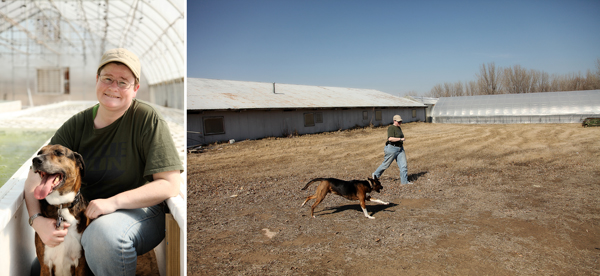
Plunked down along a stretch of busy road, the greenhouses look somewhat dilapidated from the outside, and some rusting equipment along the side just reinforces the image. But inside Swanberg’s rented space, the setup looks futuristic. Long tanks of water are fed by pipes and constantly gurgling pumps. The light inside the space is bright, pinging off all the steel and plastic like a 1970s movie about the sterility of space colonies.
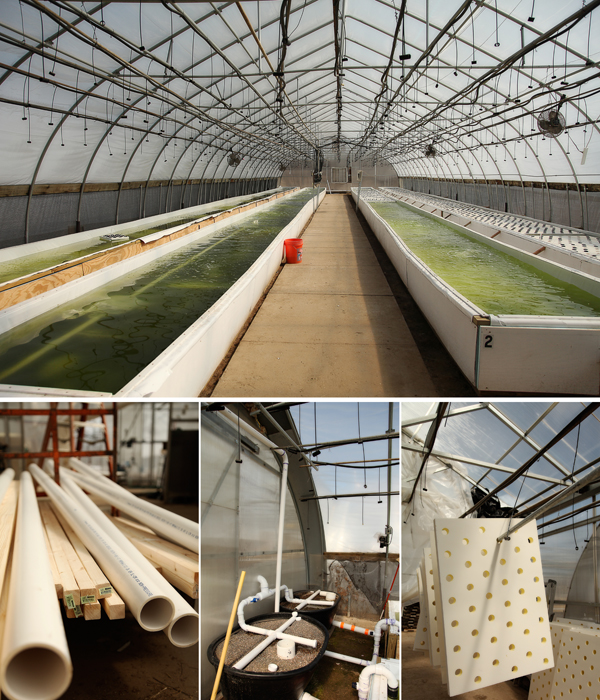
“I know I’m biased, but I just think this is the most beautiful place ever,” says Swanberg. With yellow perch darting inside the tanks, and lettuces beginning to grow in March, it’s not hard to see why she thinks so.
Aquaponics brings together traditional aquaculture, where fish or other aquatic animals are farmed, with hydroponics. The system is closed loop and symbiotic, with the nutrient-rich fish waste recirculated into the plants.
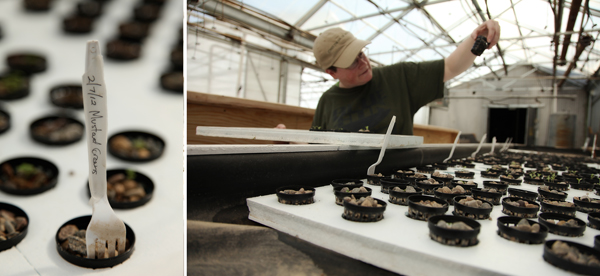
Swanberg began her journey toward aquaponics four years ago, after reading an article about the systems. She built five small tanks at her house and planted greens on nights and weekends, while maintaining a computer security job at the University of Minnesota during the day. Pretty soon, she preferred the fish.
“Doing computer security, you’re always under attack, and all your users hate you,” she says. “You’re under pressure from all sides. I was really at my most relaxed around the tanks.” She quit over a year ago to focus on aquaponics full time, and says she may be poorer, but she’s also happier.
Less happy was the challenge it took to get to the point where she’d have greens to sell. Local food demand has been rising quickly, but putting together such an elaborate construction has required patience, funding, research, and more funding.
A few months ago, Swanberg brought on a business partner, Jerry Khan, and changed the name of her effort from Howling Moose Gardens to the more formal-sounding Swanberg and Khan Aquaponics.
“The local food movement is so huge, and aquaponics can have a strong place within it,” Swanberg says. “We haven’t tried growing in the winter yet, but I’m looking forward to trying that, too.”
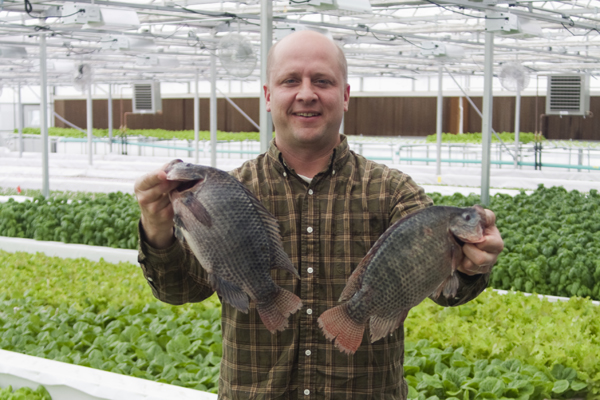
The push toward season extension — particularly through aquaponics — has been robust in the past few years (see Tricia Cornell’s recent article on cold-weather farming in the state, James Norton’s story on Future Farm pictured above, and the birth of The Urban Farm Project). But the fish-and-greens system isn’t as easy to duplicate on a large scale as a greenhouse filled with lettuces. In order to be successful on a commercial scale, there has to be plenty of passion, a nice level of scientific knowledge, and a bankroll for the numerous startup costs.
In the cities, all three of those elements are coming together at the old Hamm’s Brewery in St. Paul. Landscaper Dave Haider and a few others are turning the space into an aquaponics operation that Fred Haberman, a principal in the project, believes is impressive for numerous reasons. Not only will it be a large scale and urban, but it’ll become another vital component in a community-based local food system.
“We’re all extremely excited about this project,” says Haberman. “It’s new and innovative and we have big plans.” He couldn’t divulge much more than that, but Haberman — who has a PR firm specializing in sustainability-minded companies like Organic Valley and Great River Energy — says the local food system is changing rapidly, and aquaponics on the scale of the Hamm’s effort and Swanberg’s could supply much-needed greens not just in the winter, but also in the case of a dry summer.
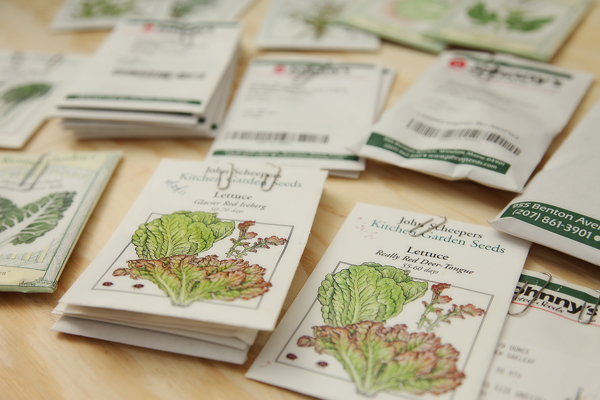
The lack of snow this year was dreamy to those who hate shoveling and snow emergency days, but it’s caused nearly every farmer in the state to be nervous. Severe drought conditions already exist across southeast Minnesota, and the rest of the state is now classified as “moderate drought.” Without all that lovely, melting snow, farms could be in for a world of hurt if we don’t see much rain this spring. That’s caused many to bolster their backup plans, like greenhouse growing and irrigation systems.
With aquaponics, those type of pray-while-planting scenarios don’t happen. Although the systems have their risks — electrical failure, poor configuration factors, pipe blockage, and other problems — they are less affected by the weather. In other words, Swanberg picked a great year to officially launch her business.
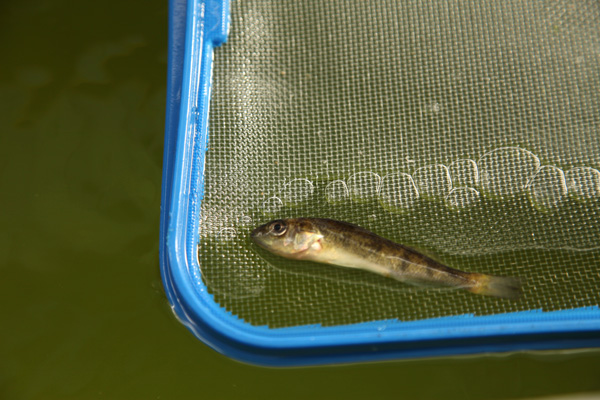
For the future, it’s likely that aquaponics success can build, as long as the plants keep producing, and the fish are well tended. Certainly, finding a local source of sustainable seafood would be welcomed by many chefs, especially with a growing drive toward responsible fishing. Chef Tim McKee of Sea Change says, “It used to be the rule that farmed fish is always a bad decision. But if done correctly, it can be better for the fish populations, and of course, better for us, too.”
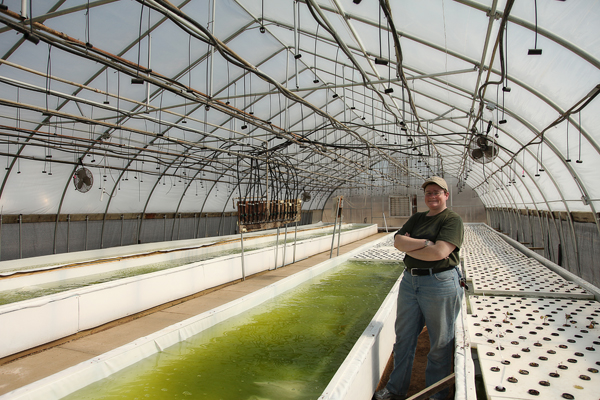
Swanberg isn’t ready to part with her fish quite yet, though. When she begins making sales pitches to restaurants and wholesalers later next month, she’ll bring a wealth of luscious greens, initially shooting to produce 300 to 400 heads of lettuce a week.
“It would be easier to say what we’re not growing, probably,” she says, looking out over the long stretch of tanks at the small (for now) leaves of Asian greens, cabbages, lettuces, cilantro, and other plants. “My initial plan was to start small and build up, maybe take a few years to increase production. But the demand for local food has bumped up my schedule by 10 years.”

Hey Karen!
Good luck from one of your former colleagues in Earth Sciences at UM (Geology and Geophysics of course when you were there)! This looks awesome and cool and I hope that soon I can be eating both greens and fish from your company.
I tried to post a comment on your company’s website but I do not have any of the accounts I seem to need to post a comment!?
David Fox
Hi Karen,
I would be interested in volunteering a few days a week to better learn how to set up my own small AP for my home. Do you need any help?
Awesome story!
I want to get me a small greenhouse and start a small operation for myself. Any suggestions on greenhouses?
i think this is awesome and would like to learn more